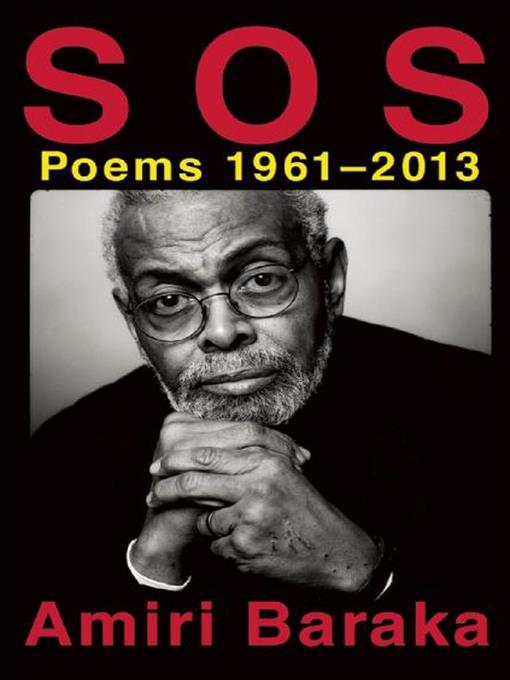
S O S
Poems 1961–2013
کتاب های مرتبط
- اطلاعات
- نقد و بررسی
- دیدگاه کاربران
نقد و بررسی

January 19, 2015
Amiri Baraka was old for quite a long time. Amiri Baraka was young for quite a long time. Each of these statements is true, or, as is evident in this career-spanning volume, each is as contradictory as the late poet--a perennial wise man and wiseass--himself. The collection, if one skims it, yields Baraka's oft-noted inflections and influences: the reeling spontaneity of the Beats, the avant-garde scaffolding of the Black Mountain School, and, especially, the swaggering cadences of African-American vernacular. (I'd include the influence of Black Arts poetics had he not been the movement's chief chef and cultivator.) A closer examination reveals that Baraka was also very consistent over the collection's 52-year spanânot just in his attention to black musical, cultural, and political lore but in his philosophical leanings. Religion is a recurring antagonism, and titles across the book highlight his heckling appraisals of dogma, doctrine, duplicity, and group thinkery: "Black Dada Nihilismus," "Heathens," "Why Is It Quiet in Some Churches." "We'll worship Jesus," he writes "when jesus get down/ when jesus get out his yellow Lincoln/ w/the built in cross stain glass/ window & box w/black peoples/ enemies." As that excerpt suggests, the book is also relentlessly irreverent. Baraka often seems akin to a voodoo doctor smiling as he needles American social order. No one is safe from his provocations, puns, and put-downs: not "Tom Ass Clarence" nor "Rush Limp Balls"; not whites, not blacks, not rich, not poor, and certainly not stupid. In "A Poem for Deep Thinkers," Baraka chastises writers petrified by craft: "the statue graveyard where Ralph/ Ellison sits biting his banjo/ strings retightening his instrument for the millionth time before/ playing the star spangled banjo." The poems live by every trickster-comedian's credo: "Say whatever you want so long as it's funny." Still, it is painful to acknowledge instances where the mockery is, as Baraka later apologetically admitted, "wrongheaded." We could add bilious, reckless, embarrassing. The aspersions are indefensible, but no serious reader would characterize Baraka's oeuvre as fundamentally malevolent. The early work reveals a poet exploring the psychology of being African-American, as well as of being a being being. "An Agony. As Now" begins, "I am inside someone/ who hates me. I look/ out from his eyes," and ends, "It is a human love, I live inside... It burns the thing/ inside it. And that thing/ screams." The contemplative musing of poems like "An Agony. As Now" and the wonderful "Footnote to a Pretentious Book" gives way to the public, polemical speech of cultural and political activism. The collection becomes, for better or/and worse, a signal of blunt urgency. Whether one views it as the work of a bully or prophet, Cassius or Cassandra, this is undeniably the work of the kind of poet we will not see again; Amiri Baraka was one of the last of the 20th century's literary lions. This momentous collection exhibits his abiding resistance to almost everything, but subversiveness. (Feb.) Terrance Hayes's newest collection, How to Be Drawn, is due out from Penguin in April.

December 1, 2014
In 1934, Everett Leroy Jones (later known as Amiri Baraka) was born in Newark, NJ. About that same time, a group of scholars known as the New Critics were busy espousing notions that would dominate the next 30 years of poetic practice. Among these was the idea that poetry and politics should not mix--that art should occupy a mythical world, free of social considerations. Over a 50-year career, Baraka would obliterate that idea by masterfully mingling the personal and the political. His work does not shill for an ideology but is one of those rarest of things: poetry that combines a rigorous intellect, high-voltage aesthetics, and a revolutionary's need to confront his subject. This collection is not the poetry of greeting cards or elementary classrooms, and those who read for escape will find no relaxing excursions in its pages. But those who believe, as Baraka did, that art could surpass simple beauty and act as a force for social change will cherish this remarkable volume. VERDICT A major figure in contemporary poetry, Baraka's work will attract those who prefer their verse weaponized. Highly reommended.--Chris Pusateri, Jefferson Cty. P.L., Lakewood, CO
Copyright 2014 Library Journal, LLC Used with permission.

























دیدگاه کاربران